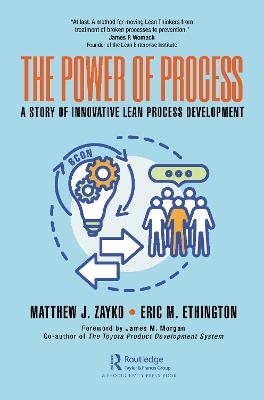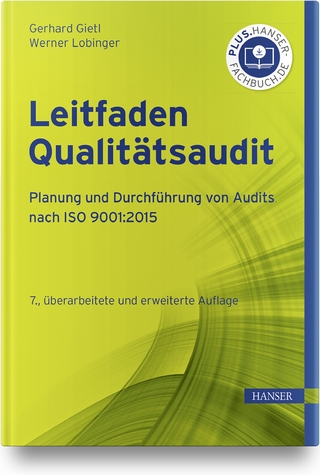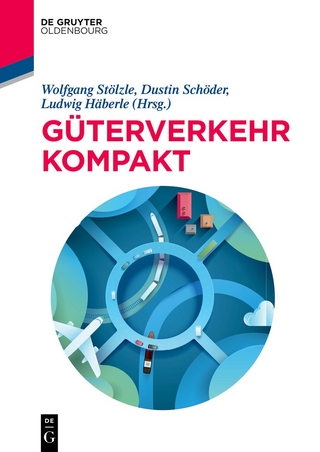
The Power of Process
Productivity Press (Verlag)
978-1-032-11391-3 (ISBN)
Lean Process Creation teaches the specific frames—the 6CON model—to look through to properly design any new process while optimizing the value-creating resources. The framing is applicable to create any process that involves people, technology, or equipment—whether the application is in manufacturing, healthcare, services, retail, or other industries. If you have a process, this approach will help. The result is 30% to 50% improvement in first-time quality, customer lead time, capital efficiency, labor productivity, and floorspace that could add up to millions of dollars saved per year. More important, it will increase both employee and customer satisfaction.
The book details a case study from a manufacturing standpoint, starting with a tangible example to reinforce the 6CON model. This is the first book written from this viewpoint—connecting a realistic transformation with the detailed technical challenges, as well as the engagement of the stakeholders, each with their own bias. Key points and must-do actions are sprinkled throughout the case study to reinforce learning from the specific to the general. In this study, an empowered working team is charged with developing a new production line for a critical new product. As the story unfolds, they create an improved process that saves $5.6 million (10x payback on upfront resource investment) over the short life cycle of the product, as well as other measurable benefits in quality, ergonomics, and delivery. To an even greater benefit, they establish a new way of working that can be applied to all future process creation activities.
Some organizations have tried their version of Lean process design following a formula or cookie-cutter approach. But true Lean process design goes well beyond forcing concepts and slogans into every situation. It is purposeful, scientific, and adaptable because every situation starts with a unique current state. In addition, Lean process design must include both the technical and social aspects, as they are essential to sustaining and improving any system.
Observing the recurring problem of reworking processes that were newly launched brought the authors to the conclusion that a practical book focused on introducing the critical frames of Lean process creation was needed. This book enables readers to consider the details within each frame that must be addressed to create a Lean process. No slogans, no absolutes. Real thinking is required. This type of thinking is best learned from an example, so the authors provide this case study to demonstrate the thinking that should be applied to any process. High volume or low, simple or complex mix, manufacturing or service/transactional—the framing and thinking works. Along with the thinking, readers are enabled to derive their own future states. This is demonstrated in the story that surrounds the case study.
Matt Zayko has more than 25 years of experience in leading lean enterprise improvements in numerous industries by helping them transform product development, engineering, manufacturing, service processes, and operating systems. Matt worked in a variety of staff- and management-level roles under the guidance of former Toyota mentors for Chrysler / University of Michigan, Gelman Sciences, Delphi, and Pall (now part of Danaher) before starting his own consultancy and affiliating with the Lean Enterprise Institute (LEI). Matt has authored numerous works based on successful transformation, including articles that have been published in “Journal of Quality Engineering”, “IIE Solutions”, “Journal of Cost Management”, a chapter in the 1998 Shingo-Prize winning book “Becoming Lean”, and white papers for the Lean Enterprise Institute. Matt is a frequent presenter at conferences related to lean transformation and a long-time faculty member of LEI (www.lean.org), working closely with smaller, entrepreneurial-minded organizations, as well as larger, global companies. Matt received his M.S. in Industrial & Operations Engineering from the University of Michigan at Ann Arbor. Eric Ethington is passionate about improvement, with over 35 years of experience feeding that passion. Starting as a fabrication area industrial engineer at General Motors’ AC Spark Plug division, making today better than yesterday has always been part of Eric’s routine. For 22 years Eric had formative experiences at Delco Electronics and Delphi, making him comfortable working with front-line operators within the plants up to senior executives at the company headquarters alike. Eric’s final years at Delphi had him leading the company’s corporate lean team, and developing and implementing processes specifically targeted at improving new product launch performance. Eric then spent the next five years in an executive position at Textron, supporting lean and six-sigma activities across several diverse businesses and industries. It was during this period that Eric earned his six-sigma black belt in design. Since 2009, Eric has continued learning and advancing both the science and art behind lean throughout the enterprise, working in diverse industries such as aerospace, healthcare, services, manufacturing and logistics. Eric holds a Bachelor of Science degree in industrial Engineering from Kettering University (formerly General Motors Institute) and an MBA in Operations from the University of Michigan, Flint campus. He supports the Lean Enterprise Institute in support of their Lean Product & Process Development initiative, and he serves on the Board of Directors at Goodwill Industries of Mid-Michigan.
Chapter-1: The Situation Chapter-2: Context Chapter-3: Concepts Chapter-4: Converge Chapter-5: Configure Chapter-6: Confirm Chapter-7: Continuously Improve Chapter-8: Conclusion
| Erscheinungsdatum | 01.11.2021 |
|---|---|
| Zusatzinfo | 124 Line drawings, black and white; 124 Illustrations, black and white |
| Verlagsort | London |
| Sprache | englisch |
| Maße | 178 x 254 mm |
| Gewicht | 607 g |
| Themenwelt | Technik ► Umwelttechnik / Biotechnologie |
| Wirtschaft ► Betriebswirtschaft / Management ► Logistik / Produktion | |
| Wirtschaft ► Betriebswirtschaft / Management ► Projektmanagement | |
| Wirtschaft ► Betriebswirtschaft / Management ► Unternehmensführung / Management | |
| Wirtschaft ► Volkswirtschaftslehre | |
| ISBN-10 | 1-032-11391-X / 103211391X |
| ISBN-13 | 978-1-032-11391-3 / 9781032113913 |
| Zustand | Neuware |
| Informationen gemäß Produktsicherheitsverordnung (GPSR) | |
| Haben Sie eine Frage zum Produkt? |
aus dem Bereich


